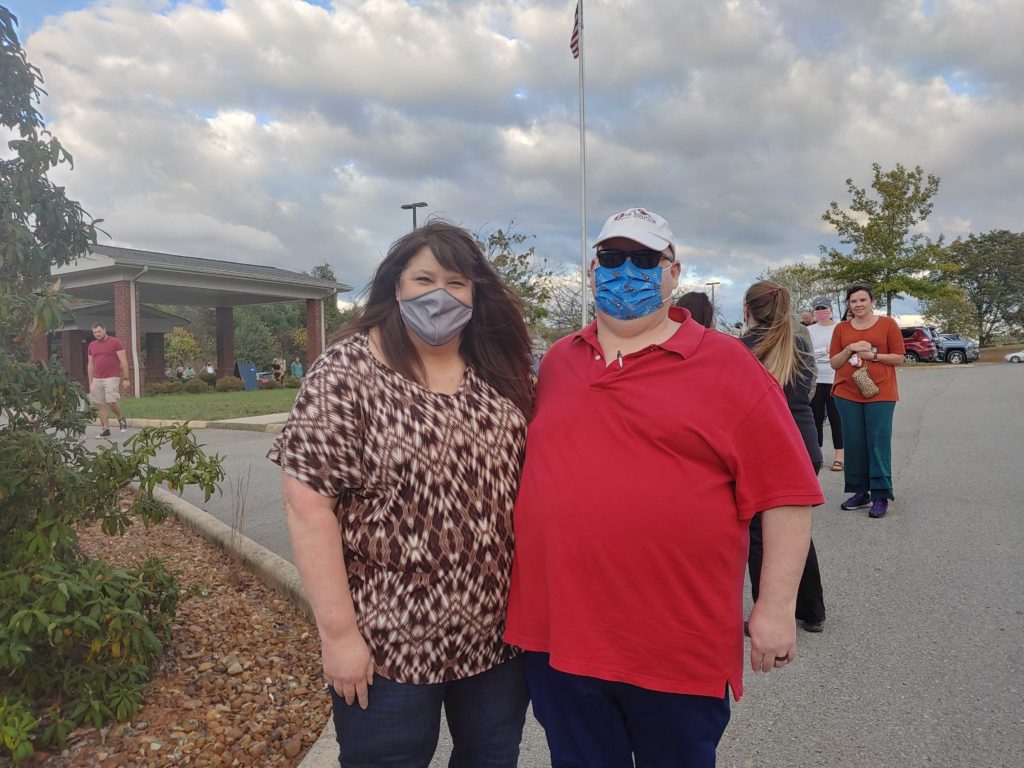
On the last day of early voting, Thomas Bandy is waiting in line at the Putnam County Elections Commission.
It’s around 4:30 p.m. and the line wraps around the building and part of the parking lot.
But Bandy’s upbeat personality makes the wait way more fun. He’s excited to cast his ballot. While waiting with his wife, Barbara, he remembers what his dad used to say.
“He used to say if you don’t vote, you can’t fuss,” Bandy said. “That’s it.”
Bandy is holding Barbara’s arm. It might look like affection, but he’s actually doing this because she is guiding him.
That is because Bandy has retinitis pigmentosa — a progressive disorder that can lead to blindness.
Right now, Bandy can’t vote by himself. He needs his wife’s assistance.
“I usually vote first so I can familiarize myself with it all,” she said. “It makes it a little quicker reading and telling him — I read everything to him, and he tells me what he wants. … But then the final vote button is a little bit bigger off to the side so I always let him push the final button so he can say he did something. He did get to vote.”
They say their experience during early voting was not that bad. But a new report by the Tennessee Disability Coalition found that Tennessee had the second-lowest turnout of voters with disabilities in 2018, at 37.6%, and that many of the challenges this community faces can have easy solutions.
In Tennessee, about 992,000 people with disabilities are eligible to vote. Doug Kruse, a co-director of the Program for Disability Research at Rutgers University, said that’s a bit over 19% of the voting age population. And the experiences of these voters will vary depending on location.
“We did a national survey funded by the Election Assistance Commission right after the 2012 election. We surveyed 3,000 people nationally and we found that among people with disabilities that vote at the polling place, 30%, so almost 1 out of 3, had some type of difficulties voting at the polling place,” Kruse said. “And that was compared to only 8 percent of people without disabilities.”
And during the last presidential election, the Government Accountability Office found that 83% of polling places nationwide had one or more potential impediments for voters with disabilities.
Jeff Strand, the coordinator of government and external affairs at the Tennessee Disability Coalition, said the state needs to prioritize making voting accessible to everyone, and his group is calling for officials to act. It says that “greater access to absentee voting, modified voter ID laws and online voter registration exemptions will reduce obstacles to voters with disabilities.”
One proposal is for the state to purchase voting machines that can read the ballot to those who are blind.
Strand said the state has the money: The Help America Vote Act of 2002 assigned over $51 million dollars to Tennessee to be used to make elections more accessible. But as of September of 2019, it had spent only about $33 million. This makes Tennessee the state with the third-most unspent money in the country.
The Secretary of State’s office told WPLN News all 95 counties have at least one accessible machine in every polling place, and that it continues to use the remaining funds to assist counties with voter registration, training and the purchase of voting machines, including ones that are accessible.
But Strand said the need is urgent.
“Thirty percent of our fellow Tennesseans are living with a disability and may require some sort of accommodation at the poling place,” he said. “And that’s only going to grow with our aging population, advances in medical technologies, the increase in chronic conditions — more and more people will live with a disability.”

